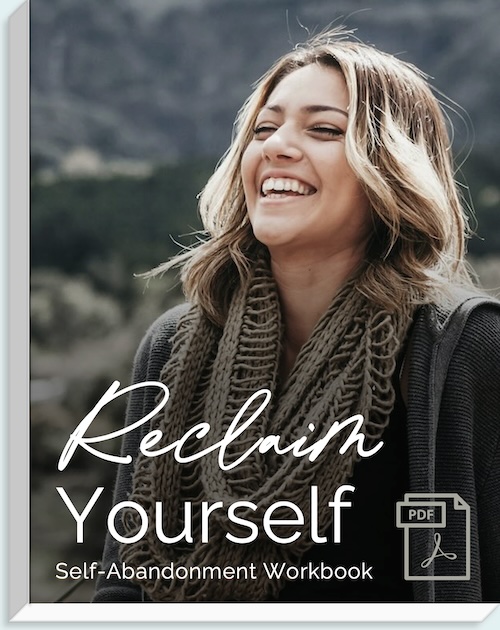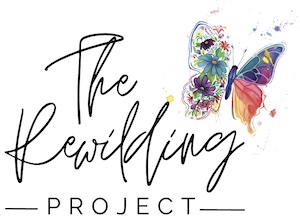Stop Self-Abandonment: How to Start Choosing Yourself in Relationships
Self-abandonment in relationships is one of the most damaging (and invisible) patterns – and for years, it shaped mine. A while back, I was in a situation where I had to choose. A while back, I found myself in a situation where I had to choose. I had to choose me – which also meant choosing “not-you.” And that wasn’t easy.
But that moment was the beginning of learning how to stop abandoning myself in love… and start choosing myself instead.
Because, I wanted something that wasn’t available; a version of what I wanted was available but not the actual thing I wanted. I wanted a committed, intimate relationship; an opportunity to build a real partnership with someone. And when it came down to it, he wasn’t available for that.
The tough part was that he kept saying he was open to it! I really liked him so I wanted to believe what he said… but his actions never lined up with what was coming out of his mouth.
In previous situations that were similar, one strategy I’ve tried is to pretend I didn’t know it wasn’t available. You know, what I mean, I’d convince myself that if I could just be a little more of ‘this’ (easy-going, fun, and attractive) and less of ‘that’ (having expectations for how he treated me) he’d eventually come around.
Basically I would deny my intuition, the inner knowing that this wasn’t going to become what I wanted because he wasn’t emotionally available. Instead, I’d cling to/focus on any little sign that I could read as progress toward what I wanted. You know “proof” that if I could just be a little more patient and forgiving, eventually things would turn in my favour.
Man, denying that inner knowing can be painful, can’t it?
The number of times I’ve fallen into self-abandonment – ignored that inner knowing or just completely blocked it – is too many to count. Until that moment, it was really the only consistent pattern in any of my relationships.
Self-abandonment. Abandoning myself in service of something else. In my case it was always trying to get someone else to love me. Tell me I was good enough. To choose me…
This time I chose me.
It wasn’t easy. It wasn’t comfortable, but that was the beginning of the road to me finally self-advocating – choosing me – on the regular.
All that time I’d spent trying to get other people to validate me and make me feel like I mattered and like I was worth it, was never going to ‘make me feel’ worthy. That could never truly come from someone else. Until I believed it myself, it would be impossible to believe it when it came from another. It wouldn’t ring true, because it wouldn’t align with my beliefs about myself.
This pattern of allowing another’s needs/opinions to carry more weight than our own, and then doing whatever we need to, to keep the other person happy and engaged in the relationship is called self abandonment or self betrayal, and it sucks.
The trouble is, until we start to do our work, we don’t see that we’re making this choice of self-abandonment. It just seems like ‘that’s how it is’ and I don’t understand what I’m doing wrong…
It seems normal or ‘just the reality of it’ that we have to take what we can get or compromise and settle.
If you look further into your life, you’ll see that this doesn’t just apply to your intimate relationships. It’s rampant in your life; friendships, family, money, sex, career….
What is Self-abandonment?
Self-abandonment: Rejecting, suppressing, or ignoring part(s) of yourself – needs/ wants/ limits/ boundaries in order to do something like maintaining a relationship or getting people to like you.
This chronic behaviour has lots of signs and symptoms:
- Saying “yes” when you really want to say “no”
- Putting your needs last to avoid disappointing others
- Giving up on promises and commitments you make to yourself
- Self-silencing instead of standing up for yourself
- Letting bad behaviour slide, on the regular
Sound familiar?
It’s also the inner-knowing that every time you do it you’re betraying part of yourself, but sadly not knowing what else you can do about it.
(If that’s hitting close to home, I created something for you... It’s a free guide called Reclaim Yourself, and it walks you through why the pattern of self-abandonment shows up, how it keeps you stuck, and what you can start doing to shift it – especially in the moments when speaking up feels impossible. You can download it HERE.)
If you abandon yourself in one place, you’ll do it in other areas too.
And you’re not alone.
In our culture most of us have been conditioned for self-abandonment; to acquiesce, to yield to another:
- Don’t talk back
- If you can’t say something nice
- Don’t make a scene/embarrass me
- Children should be seen and not heard
- Quit being so bitchy/grumpy/rude/etc.
- You should do this instead of that
- Don’t rock the boat
You get the gist. You’ve likely been receiving messages like this your whole life, and those messages are telling you that how you feel is less than how someone else feels.
A couple of caveats here: first, I get that was unlikely the intention of the people sending those messages, for you to believe your feelings and needs were ‘less than.’ Second, I agree there are times when that message is simply required. There are definitely times and places where how you feel does take a backseat. The trouble lies in the consistency of that message over a period of time.
When you’re constantly being told in one way or another that your needs and feelings are less than, and then being rewarded for adjusting yourself to meet their needs/desires/expectations, you’ll internalize that as the truth; how you feel and what you need is less than another.
This is one of the key ways we learn to avoid conflict in order to keep the peace.
When we’re ‘rewarded’ for adjusting our behaviour to suit another’s (especially when we’re young) we learn that making someone else feel good is better or more important than how we feel. We can internalize someone else’s praise for ‘being a good girl/boy’ as love, the thing we need as little ones.
That then becomes part of how you view the world -> when I’m a ‘good girl/boy’ and take care of someone else’s feelings, I receive love.
In other words: in order to be loved by others I needed to quiet my voice and myself.
Inevitably we learn to get our needs met in and around everyone else’s and it just becomes the norm to put other people first and abandon ourselves.
But ask yourself how this message perpetuates itself in your life; what are you:
- Not saying?
- Keeping quiet?
- Not asking for?
- Pretending you don’t need?
- Taking care of on your own?
- Working around to avoid conflict?
- Saying yes to when you don’t want to?
Now ask yourself what results you’re getting; are you:
- Happy?
- Fulfilled?
- Self-assured?
- Feeling truly valued?
- Empowered in your life?
- Confident in yourself and your worth?
- Trusting you’re wanted and loved?
- Comfortable in your own skin?
When we put our needs second or last (self-abandonment) we’ll never fully feel any of those things, like feel it in your bones as truth.

How do you stop self-abandonment?
As a chronic self-betrayer, I can confirm this is a tricky pattern to shift and is definitely an inside out job rather than working from the outside in. This is an internal issue connected to both the way you think (thoughts and beliefs) as well as your nervous system.
My whole life I’d been shaped and conditioned to play nice and be easy – easy to be around, easy to work with, easy to get along with, easy to look at, easy in lots of ways – and man, it took a toll on my EVERYTHING. No matter how much I stretched and twisted myself throughout my adult life, all it eventually got me was a major depressive episode, which was essentially caused by my years of self-abandonment and self-betrayal. It was a painful and costly lesson to learn.
So, how do you stop self-abandonment?
First, you have to recognize how it shows up in you life; the situations you do it in, the people you tend to do it with, the circumstances that seem to automatically make you abandon and betray yourself.
I recommend starting to make a comprehensive list, maybe even keep a track in your notes app on your phone. If you need to copy and paste the list of examples toward the top of this post at the top of that list for a reminder. Anytime you leave a situation wishing you could have said or done something different or kicking yourself for what you did or didn’t do, make a note of it. It’s likely you’ll start to see a pattern.
If you’re like a lot of people, if you do this in one place it’s likely you do it most places in your life. It may not be comfortable to acknowledge this for yourself but the more honest you can be, the better a shot you’ll have at changing the behaviour.
Second, you have to identify what you’d rather do in those situations. My recommendation is that you take the list you made and go situation by situation and write out what you’d have preferred to have done – what would you have rather you said instead of what actually happened? What would you have rather you did than than what actually happened?
Taking the time to really think about what you’d rather, is a giant step in giving your brain a target to go for the next time the situation comes up.
I’d also recommend practicing doing the new thing and saying the new thing, multiple times. It’s easier to do in the moment if your brain has familiarity with the new action and words. Part of the reason changing the old pattern is so challenging is due to how common and frequently you do the old, unwanted thing. It’s become a very normal neural pathway for your brain to navigate, so when you’re in the moment and under stress that old familiar pathway is the easiest to find.
Third, you need to prepare yourself for how uncomfortable it will feel in your body to do this different thing. I bet when you even think about doing the new thing or saying the new thing, that you feel some sort of stress in your body – let alone when you’re in the moment trying to do the new thing!
Being prepared for the stress response – your body responding with the fight/flight/freeze response – is important to know about ahead of time. It’s a totally normal thing to have happen, so you don’t have to let it stop you from trying the new thing or saying the new thing. And if it does stop you at first, that’s ok too! Don’t be too hard on yourself. Learning new behaviours like stopping self-abandonment, is really challenging, keep reminding yourself you’re overcoming (basically) a lifetime of behaviour and it won’t happen overnight.
The important thing is that you’re trying, because…
The hidden cost of self-abandonment.
When it has a grip on you, the dreams you have, the life you want – the LOVE you want – are unavailable in any kind of authentic way. You can’t build the life of your dreams by compromising and betraying yourself.
Self-abandonment is actually a root cause of many serious issues:
Burnout:
You’re naturally a high-achiever – it’s in your blood – but lately that same drive isn’t getting you the results you’re used to. In fact, you’re actually feeling unsatisfied and unfulfilled, and that’s not okay with you.
Unsatisfying Relationships:
Whether you’re perpetually single, a serial monogamist, or have been married for decades – no matter where you fall on the relationship spectrum – the love and connection you’re heart and soul are dying for just isn’t there…
Questioning Your Future:
You’ve given it your all for your whole life, and sure it’s ‘worked’ up to now, but the thought of living the rest of your life this way feels heavy and exhausting.
But it doesn’t have to be that way…
Imagine YOU, standing fully in your power:
- Deeply connected to your inner truth
- Setting and holding boundaries that serve you
- Relationships built on the foundation of authenticity and truth
- Holding the balance of fierceness and femininity
- Living your life with meaning and purpose
YOU: grounded in the knowledge that you are enough.
What would be possible for you and the dreams you have (including the ones you’ve forgotten about or given up on) if all of THAT was a reality for you?
Probably kinda hard to wrap your head around that, right? I get it… but my friend, let me ask you: are you ready to try?
YOU are worth the risk. YOU are worth the discomfort.
You know it’s time to stop abandoning yourself.
This free guide is your first step to reclaiming your power.
You’ve spent long enough putting everyone else’s needs ahead of your own – pretending everything’s okay when it’s not.
It’s time to come back to yourself. It’s time to take your life back.
“This guide is sooooo good! Everything makes sense, and it feels like it was written just for me.”
Melissa – Reader
(No spam. No pressure. Just a guide to help you come home to yourself.)








